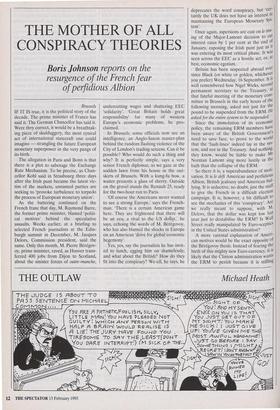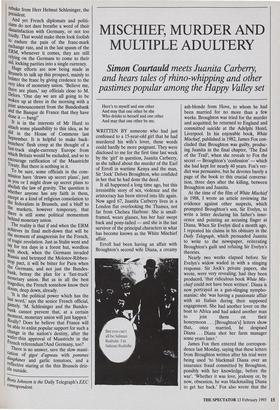THE MOTHER OF ALL CONSPIRACY THEORIES
Boris Johnson reports on the
resurgence of the French fear of perfidious Albion
Brussels IF IT IS true, it is the political story of the decade. The prime minister of France has said it. The German Chancellor has said it. Were they correct, it would be a breathtak- ing piece of skulduggery, the most cynical act of international statecraft one could imagine — strangling the future European monetary superpower in the very pangs of its birth.
The allegation in Paris and Bonn is that there is a plot to sabotage the Exchange Rate Mechanism. To be precise, as Chan- cellor Kohl said in Strasbourg three days after the Irish punt became the latest vic- tim of the markets, unnamed parties are seeking to 'provoke turbulence to torpedo the process of European monetary union'.
As the battering continued on the French franc that day, M. Raymond Barre, the former prime minister, blamed 'politi- cal motives' behind the speculative assaults. Weeks earlier, at a briefing to selected French journalists at the Edin- burgh summit in December, M. Jacques Delors, Commission president, said the same. Only this month, M. Pierre Beregov- oy, prime minister, raved, as Hoover trans- ferred 400 jobs from Dijon to Scotland, about the sinister forces of outre-manche,
undercutting wages and shattering EEC `solidarity'. 'Great Britain holds great responsibility' for many of western Europe's economic problems, he pro- claimed.
In Brussels, some officials now see an intelligence, an Anglo-Saxon master-plan behind the random flashing violence of the City of London's trading screens. Can it be possible? Who would do such a thing and why? It is perfectly simple, says a very senior French diplomat, as we gaze at the sodden lawn from his house in the out- skirts of Brussels. With a kung-fu bow, a waiter presents a glass of sherry. Outside on the gravel stands the Renault 25, ready for the two-hour run to Paris.
`Of course the Americans never wanted to see a strong Europe,' says the French- man. 'There is a certain American game here. They are frightened that there will be an ecu, a rival to the US doll4r,' he says, echoing the words of M. Beregovoy, who has also blamed the shocks in Europe on an American 'drive for global economic hegemony'. Yes, yes, say the journalists he has invit- ed to lunch, egging him on shamelessly; and what about the British? How do they fit into the conspiracy? We-ell, he says, he
deprecates the word conspiracy, but 'cer- tainly the UK does not have an interest in maintaining the European Monetary Sys- tem'.
Once again, aspersions are cast on le tim- ing of the Major-Lamont decision to cut interest rates by 1 per cent at the end of January, exposing the Irish punt just as It was entering its most critical phase. It was seen across the EEC as a hostile act, or, at best, economic egotism. • Britain has been suspected abroad ever since Black (or white or golden, whichever you prefer) Wednesday, 16 September. It is well remembered how Nigel Wicks, second permanent secretary to the Treasury, at that fateful meeting of the monetary com- mittee in Brussels in the early hours of the following morning, asked not just for the pound to be suspended from the ERM. He asked for the entire system to be suspended. Since the immolation of its economic policy, the remaining ERM members have been aware of the British Government's need to save face, to prove to the world that the 'fault-lines' indeed lay in the sys- tem, and not in the Treasury. And nothing, they know, would be liable to make Mr Norman Lamont sing more lustily in the bath than the collapse of the ERM. So there it is, a superabundance of moti- vation. It is le defi American and perfidious Albion, British jealousy and American bul- lying. It is seductive, no doubt, just the stuff to give the French in a difficult election campaign. It is, however, a bit difficult to see the mechanics of this 'conspiracy'. Are we really meant to suppose, with M. Delors, that the dollar was kept low last year just to destabilise the ERM? Is Wall Street really manipulated by Euro-sceptics in the United States administration?
A more rational explanation of Ameri- can motives would be the exact opposite of the Beregovoy thesis. Instead of fearing the birth of this mighty new Euro-currency, it is likely that the Clinton administration wants the ERM to perish because it is stifling growth in Europe. As Giles Keating of Credit Suisse First Boston says: 'Many Peo- ple in the new Clinton administration would not be upset if the ERM were to be suspended, because it would lead to a more balanced monetary policy in the EEC. That, he argues, would encourage growth in Europe, and assist an American recov- ery.
But even if that were the motive for a covert operation, how could the American administration influence the speculators? As for the suggestion that the foreign exchange markets are deliberately trying to scupper monetary union because it will, by definition, deprive them of revenue from currency fluctuations, it credits them with too much foresight. Men like George Soros, who made a killing over the collapse of the pound, look to short-term profits. Medium-term strategy, let alone politics, is not their game.
It would be wonderful if it were true, moreover, but there is just no evidence that the Bank of England is dumping French francs and Danish kroner, at dead of night, on the Tokyo market, to weaken those cur- rencies further. As for British interest rates, like US interest rates they are set with the needs of the domestic economy in mind, not their possible impact on neigh- bours such as Ireland.
No, the conspiracy theory tells us less about the gnomes of Wall Street and their puppet-masters in the US administration than it tells us about the paranoia and siege mentality of the French socialist govern- ment and its satrap in Brussels, M. Jacques Delors. For the 'plot' contains one striking omission.
France rages at Britain for its 'selfish' and 'dead end' economic policies. It is just not fair, says M. Beregovoy, that he should be six weeks from an election with 3 mil- lion unemployed, catastrophic opinion polls, and yet be forced to keep interest rates at 14 per cent. But it is not British economic policy that keeps French interest rates so high.
Which party has, by leak and innuendo, continually tried to undermine the ERM since last summer? Not Britain or America. Who talked down the pound? Who failed to intervene intermarginally (i.e. before the currency hits its ERM floor) during the final travails of the Irish punt? No conspiracy theory of the destruction of the ERM is complete without the role of the Frankfurt Bundesbank. Its motive — to preserve the deutschmark — could not be clearer. One member of its council, Herr Reimut Jochimsen, has repeatedly affirmed his hostility to monetary union, without `Wretched Sixties architects.' rebuke from Herr Helmut Schlesinger, the president.
And yet French diplomats and politi- cians do not dare breathe a word of their dissatisfaction with Germany, or not too loudly. That would make them look foolish to endure the pain of the franc-mark exchange rate, and in the last spasm of the ERM, whenever it comes, they are still relying on the Germans to come to their aid, locking parities into a single currency.
Huge efforts are now being made in Rrossels to talk up this prospect, mainly to bolster the franc by giving credence to the very idea of monetary union. 'Believe me, there are plans,' say officials close to M. belors. 'One day we are all going to be Woken up at three in the morning with a Joint announcement from the Bundesbank and the Banque de France that they have done it — bang!'
It is in the interests of Mr Hurd to attach some plausibility to this idea, as he did in the House of Commons last September. It is helpful to make back- benchers' flesh creep at the thought of a fast-track single-currency Europe from Which Britain would be excluded, and so to encourage ratification of the Maastricht Treaty. But there is nothing in it. To be sure, some officials in the corn- Mission have 'drawn up secret plans', just as you or I might draw up secret plans to abolish the law of gravity. The question is Whether anyone has any faith in them, except as a kind of religious consolation to the federalists in Brussels, and a bluff to the markets, however temporary, that there is still some political momentum behind monetary union. The reality is that if and when the ERM achieves its final melt-down that will be the moment of anagnorisis for the French, of tragic revelation. Just as Stalin went and lay for ten days in a forest hut, wordless With shock, when the Germans invaded Russia and betrayed the Molotov-Ribben- trop pact, it will be bitter for Paris when the Germans, and not just the Bundes- bank, betray the plan for a last-track' monetary union. But as in all the best tragedies, the French somehow know their doom, deep down, already. It is the political power which has the last word,' says the senior French official, gamely. 'M. Schlesinger and the Bundes- bank cannot prevent that, at a certain Moment, monetary union will just happen.' Really? Does he believe that France will be able to enlist popular support for such a change in the nation's destiny, after the wafer-thin approval of Maastricht in the French referendum?And Germany, too? There is no answer, save the slow masti- cation of gigot d'agneau with pommes 414Phines and garlic tomatoes, and a reflective staring at the thin Brussels driz- zle outside.
Rods Johnson is the Daily Telegraph's EEC correspondent.




















































 Previous page
Previous page